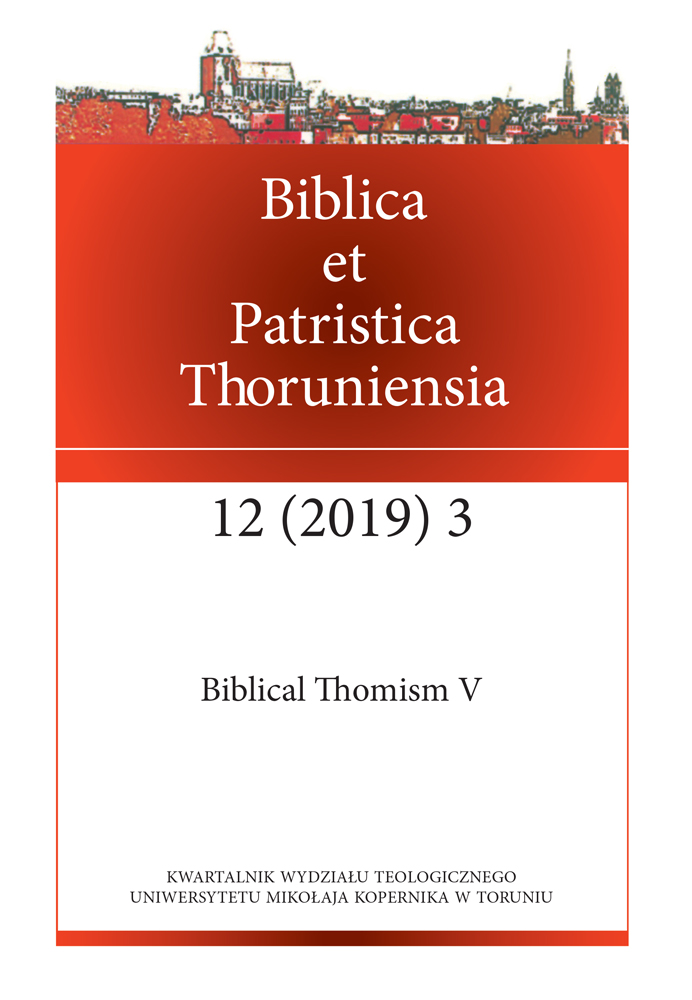Relation in Trinitarian Theology: Thomas Aquinas and the Church Fathers
DOI:
https://doi.org/10.12775/BPTH.2019.012Słowa kluczowe
Trójca, relacja, św. Tomasz z Akwinu, Ojcowie KościołaAbstrakt
Relacje w teologii trynitarnej: św. Tomasz z Akwinu i Ojcowie Kościoła
Relacja zawsze była wykorzystywana jako narzędzie do zrozumienia głównych prawd Pisma, tj. Boga jako absolutnie jedynego i nieredukowalnie trojakiego. W tym artykule najpierw przeanalizowałem użycie relacji w trynitarnych rozważaniach Ojców Kościoła, szczególnie w odniesieniu do Bazylego Wielkiego, Grzegorza z Nazjanzu i Augustyna. Następnie wyjaśniłem, jak Tomasz rozumie relację jako szczególną kategorię bytu i jak jego rozumienie boskich osób jako utrzymujących relacje ukazuje doskonałe przedstawienie biblijnych prawd z jednej strony, a z drugiej zaś strony, zapewnia dość zrównoważony, a tym samym akomodacyjny trynitarny monoteizm w którym funkcjonalne wykorzystanie relacji przez Ojców Kościoła łączy się ze sobą, a szczególnie wyróżniają się ich wnikliwe refleksje na temat Trójcy.
Bibliografia
Sources
Augustin. De Trinitate. Translation by A. W. Haddan (Nicene and Post-Nicene Fathers of the Christian Church, Series I, Vol. III; Edinburgh: T&T Clark, 1871); Translation by Edmund Hill, The Trinity (Works of Saint Augustine, Part 1, Vol. 5; Hyde Park, N.Y.: New City Press, 1991).
Basil of Caesarea. Contra Eunomius. Translation by Mark Delocgliano and Andrew Radde-Gallwitz, Against Eunomius (The Fathers of the Church, Vol. 122; Washington, D.C.: The Catholic University of America Press, 2011).
Eunomius. The First Apology. Translated by William Whiston (1711). http://www.tertullian.org/fathers/eunomius_apology01.htm retrieved on Feb. 10, 2019.
Gregory of Nazianzus. On God and Christ: The Five Theological Orations and Two Letters to Cledonius. Translated by Frederic Williams and Leonel Wickham. New York: St Vladimir’s Seminary Press, 2002.
Thomas Aquinas. Scriptum Super Libros Sententiarum. Thomas Aquinas. On the Power of God, 3 Vols. Translated by English Dominican Fathers. London: Burns Oates and Washbourne, 1932–1934.
Thomas Aquinas. Summa Theologiae, 3 Vols. Translated by English Dominican Fathers. New York: Benziger Brothers, Inc., 1947–1948.
Thomas Aquinas. Summa Theologiae, Latin text and English translation, 60 Vols. Edited by Gilby, Thomas. [Blackfriars Edition] London: Eyre & Spottiswoode, 1964–1974.
Thomas Aquinas. On the Truth of the Catholic Faith. Summa Contra Gentiles. 5 Vols. Translated by Pegis, Anton; Anderson, J.F.; Bourke, V.J.; and O’Neil, C.J. New York: Doubleday, 1955–1957.
Thomas Aquinas. Truth. 3 vols. Translated by Mulligan, Robert W., James V. McGlynn, and Robert W. Schmidt. Chicago: Regnery, 1952–54; reprint, Indianapolis: Hackett, 1994.
Studies
Ayres, Lewis. Nicaea and Its Legacy: An Approach to Fourth-Century Trinitarian Theology. Oxford, 2004.
Ayres, Lewis. “The Fundamental grammar of Augustine’s Trinitarian Theology.” Augustine and his Critics: Essays in Honour of Gerald Bonner, eds. Robert Dodaro and George Lawless, 51–76. London and New York: Routledge, 2002.
Awad, Najeeb. “Thomas Aquinas’ Metaphysics of „Relation” and „Participation” and Contemporary Trinitarian Theology.” New Blackfriars 62 (2010): 652–670.
Bai, Ziqiang, “Relation as the Ratio of the Trinity’s Mission in St. Thomas’s Trinitarian Theology in Summa Theologiae, Prima Pars, QQ 27–34.” University of Santo Tomas, Philippines, 2017.
Beeley, Christopher. Gregory of Nazianzus on the Trinity and the Knowledge of God. New York: Oxford University Press, 2008.
Dodaro, Robert and George Lawless, (eds.). Augustine and his Critics: Essays in Honour of Gerald Bonner. London and New York: Routledge, 2002.
Emery, Gilles, O.P. Trinity, Church, And The Human Person: Thomistic Essays. Naples: Sapientia Press of Ave Maria University, 2007.
Emery, Gilles, O.P. Trinity in Aquinas. Naples: Sapientia Press of Ave Maria University, 2003.
Emery, Gilles, O.P. The Trinitarian Theology of Thomas Aquinas. Translated by Francesca Aran Murphy. Oxford: Oxford University Press, 2007.
Emery, Gilles, O.P. “Ad aliquid: Relation in the Thought of St. Thomas Aquinas.” Theology Needs Philosophy: Acting Against Reason is Contrary to the Nature of God, ed. Matthew L. Lamb, 175–201. Washington, D.C.: The Catholic University of America Press, 2016.
Emery, Gilles, O.P. and Matthew Levering, (eds). Aristotle in Aquinas’s Theology. Oxford University Press, 2015.
Gioia, Luigi. The Theological Epistemology of Augustine’s De Trinitate. Oxford University Press, 2008.
Hildebrand, Stephen. The Trinitarian Theology of Basil of Caesarea: A Synthesis of Greek Thought and Biblical Truth. Washington D.C.: Catholic University of America Press, 2011.
Henninger, Mark, S.J. Relations: Medieval Theories 1250–1325. Oxford: Clarendon, 1989.
Lamb, Matthew, (ed.). Theology Needs Philosophy: Acting Against Reason is Contrary to the Nature of God. Washington, D.C.: The Catholic University of America Press, 2016.
Lienhard, Joseph, S.J. “Augustine of Hippo, Basil of Caesarea, and Gregory Nazianzen.” Orthodox Readings of Augustine, ed. George E. Demacopoulos and Aristotle Papanikolaou, 81–99. Crestwood, NY: St. Vladimir’s Seminary Press, 2008.
Pinckaers, Servais, O.P. The Sources of Christian Ethics. Translated by Sr. Mary Thomas Noble, O.P. Washington, D.C.: The Catholic University of America Press, 1995.
Roszak, Piotr and Jörgen Vijgen, (eds.). Reading Sacred Scripture with Thomas Aquinas. Brepols: Turnhout, 2015.
Roszak, Piotr and Jörgen Vijgen. Towards A Biblical Thomism: Thomas Aquinas and the Renewal of Biblical Theology. Pamplona: Ediciones Universidad De Navarra, SA. 2018.
Torrell, Jean-Pierre, O.P. Saint Thomas Aquinas Vol. 2: Spiritual Master. Washington, DC.: The Catholic University of America Press, 2003.
Van Nieuwenhove, Rik. Wawrykow, Joseph, (eds.). The Theology of Thomas Aquinas. Notre Dame: University of Notre Dame Press, 2005.
White, Thomas Joseph, O.P. “Thomism after Vatican II.” Nova et Vetera, [English Edition]. Vol. 12, No. 4 (2014): 1045–1061.
Pobrania
Opublikowane
Jak cytować
Numer
Dział
Licencja
CC BY ND 4.0. Posiadaczem prawa autorskiego (Licencjodawcą) jest Autor, który na mocy umowy licencyjnej udziela nieodpłatnie prawa do eksploatacji dzieła na polach wskazanych w umowie.
- Licencjodawca udziela Licencjobiorcy licencji niewyłącznej na korzystanie z Utworu/przedmiotu prawa pokrewnego w następujących polach eksploatacji: a) utrwalanie Utworu/przedmiotu prawa pokrewnego; b) reprodukowanie (zwielokrotnienie) Utworu/przedmiotu prawa pokrewnego drukiem i techniką cyfrową (e-book, audiobook); c) wprowadzania do obrotu egzemplarzy zwielokrotnionego Utworu/przedmiotu prawa pokrewnego; d) wprowadzenie Utworu/przedmiotu prawa pokrewnego do pamięci komputera; e) rozpowszechnianie utworu w wersji elektronicznej w formule open access na licencji Creative Commons (CC BY-ND 3.0) poprzez platformę cyfrową Wydawnictwa Naukowego UMK oraz repozytorium UMK.
- Korzystanie przez Licencjobiorcę z utrwalonego Utworu ww. polach nie jest ograniczone czasowo ilościowo i terytorialnie.
- Licencjodawca udziela Licencjobiorcy licencji do Utworu/przedmiotu prawa pokrewnego nieodpłatnie na czas nieokreślony
PEŁEN TEKST UMOWY LICENCYJNEJ >>
Statystyki
Liczba wyświetleń i pobrań: 800
Liczba cytowań: 1



